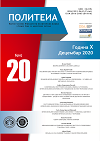Rehabilitation of Urban Heritage in the Service of Ethno-National Divisions on the Example of Sarajevo and Banja Luka
Rehabilitation of Urban Heritage in the Service of Ethno-National Divisions on the Example of Sarajevo and Banja Luka
Author(s): Ranka Perić RomićSubject(s): Culture and social structure , Social differentiation, Rural and urban sociology, Sociology of Culture, Identity of Collectives
Published by: Fakultet političkih nauka Univerziteta u Banjoj Luci
Keywords: cultural-historical heritage; ethno-national identity; rehabilitation; revitalization; space;
Summary/Abstract: This paper discusses the impact of the process of rehabilitation and revitalisation of the cultural and historical heritage of Banja Luka and Sarajevo on the strengthening of ethno-national policies /patterns of a divided society. Special attention will be paid to the processes of preserving the urban centres/historical cores of the mentioned cities, which are recognisable as places of separation and distancing for ‘non-belonging’ ethnic groups. In that sense, the rehabilitation of the urban heritage of Banja Luka and Sarajevo will not be exclusively problematised as preservation and aestheticisation of cultural and historical heritage ‘per se’, but as a kind of instrumentalisation of urban space for the purpose of overemphasising ethno-national identities in the post-war period. The survey will be primarily based on a comparative analysis of available data on the development of urban centres so far. The survey results indicate that the mentioned instrumentalisation of urban heritage is manifested through the planning and construction/renovation of specific facilities that (un)justifiably fit into the existing cultural and historical context characteristic of these cities. From that perspective, it is noticeable that the cultural and historical cores of Banja Luka and Sarajevo today have a far more significant role in promoting ethno-national identities and divisions than was the case in the past. The character of these processes does not have exclusively intentional features, but is conditioned by other current policies of urban development that do not have an ethno-national background.
Journal: Politeia - Naučni časopis Fakulteta političkih nauka u Banjoj Luci za društvena pitanja
- Issue Year: 10/2020
- Issue No: 20
- Page Range: 23-40
- Page Count: 18
- Language: English

